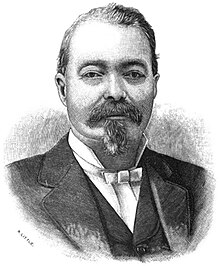Joseph Sprigg (attorney general)
|
Honorable Joseph Sprigg |
|
|---|---|

Engraved portrait of Sprigg, 1890
|
|
| 6th Attorney General of West Virginia | |
|
In office January 1, 1871 – December 31, 1872 |
|
| Governor |
William E. Stevenson John Jeremiah Jacob |
| Preceded by | Aquilla B. Caldwell |
| Succeeded by | Henry M. Mathews |
| Member of the West Virginia House of Delegates from the 2nd Delegate District | |
|
In office January 9, 1889 – January 14, 1891 |
|
| Preceded by | J. J. Chipley |
| Succeeded by | C. L. Campbell |
| Personal details | |
| Born | October 1835 "Swan Ponds", Hampshire County, Virginia (present-day West Virginia) |
| Died |
November 3, 1911 (aged 76) Cumberland, Maryland |
| Resting place | Rose Hill Cemetery, Cumberland, Maryland |
| Political party | Democratic Party |
| Spouse(s) | Mary Ellen Stubblefield Sprigg |
| Relations |
John Van Lear McMahon (uncle) James Sprigg (uncle) Michael Sprigg (uncle) Clement Vallandigham (uncle) John A. McMahon (brother-in-law) |
| Children | Ellen "Nellie" Bell Sprigg Jane Duncan Sprigg Beall Ada Beckham Sprigg Griffith Mary McMahon Sprigg |
| Parents | Joseph Sprigg (father) Jane Duncan McMahon Sprigg (mother) |
| Residence |
Moorefield, West Virginia Cumberland, Maryland |
| Profession | lawyer and politician |
| Religion | Episcopalian |
Joseph Sprigg (October 1835 – November 3, 1911) was an American lawyer and politician in the U.S. state of West Virginia. Sprigg served as the sixth Attorney General of West Virginia from January 1, 1871, until December 31, 1872, and was the first Democrat to serve in the post. Sprigg was an organizer of the Democratic Party of West Virginia and the West Virginia Bar Association, of which he served as its inaugural president.
Sprigg was born in 1835 on his father's farm in Hampshire County, Virginia (present-day West Virginia). He was a descendant of English pioneer Thomas Cresap, a nephew of Maryland lawyer John Van Lear McMahon, and U.S. House Representatives James Sprigg, Michael Sprigg, and Clement Vallandigham. He studied jurisprudence in Baltimore and was admitted to the Maryland bar in 1858. Following a hiatus during the American Civil War, Sprigg relocated to Moorefield, West Virginia, in 1866 and established a law partnership with former judge J. W. F. Allen. That year, Sprigg was instrumental in organizing the Democratic Party of West Virginia.
In 1870, he was selected as the party's nominee for Attorney General of West Virginia, won election to the post and served from 1871 until 1872. During his term as attorney general, Sprigg decided that the Chesapeake and Ohio Railway Company was subject to taxation by the state; the case was appealed to the Supreme Court of the United States, which sustained Sprigg's decision. In 1886, Sprigg organized the West Virginia Bar Association; after being elected the inaugural president, he delivered the opening address at the organization's first meeting. Sprigg was elected to several terms as mayor of Moorefield and was afterward elected to a seat in West Virginia House of Delegates in 1888 representing the Second Delegate District, which consisted of Grant and Hardy counties. Following the disputed 1888 gubernatorial election between Aretas B. Fleming and Nathan Goff, Jr., Sprigg was appointed in 1889 as secretary of a joint committee of the West Virginia Legislature charged with investigating and deciding the results of the election.
...
Wikipedia
